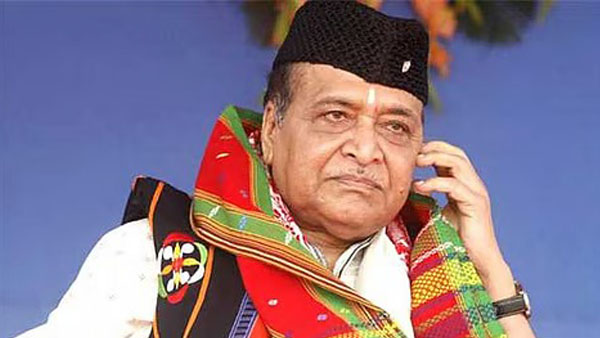By Satyabrat Borah
In the lush green valleys of Assam, where the mighty Brahmaputra River winds its way like a silver thread through the heart of the land, a voice was born that would echo across generations. That voice belonged to Bhupen Hazarika, a man whose life was as vast and nurturing as the river he loved so deeply. People in Assam still call him the Bard of the Brahmaputra, or Sudha Kontho, the sweet-throated singer, because his melodies carried the soul of their homeland far beyond its borders. Born on a crisp September morning in 1926, in the quiet town of Sadiya, Bhupen came into a world rich with stories, songs, and the gentle rhythm of nature. His father, Nilakanta Hazarika, was a simple man who worked in the railways, but it was his mother, Shantipriya, who first filled young Bhupen’s ears with the magic of music. She would sing him lullabies in the evenings, soft tunes drawn from Assam’s ancient folk traditions, weaving tales of love, loss, and the beauty of the everyday. As the eldest of ten children, Bhupen grew up in a home buzzing with laughter and learning, where music was not just entertainment but a way to connect with one’s roots.
From his earliest days, Bhupen showed a spark that set him apart. His family moved around Assam a bit, following his father’s job, but it was in Tezpur, at the age of just ten, that his talent truly blossomed. During a public event at a local school, little Bhupen stepped onto the stage and sang a Borgeet, one of those timeless devotional songs from Assam’s Vaishnava heritage, taught to him by his mother. The audience included two giants of Assamese culture: Jyotiprasad Agarwala, a poet, playwright, and the pioneer of Assamese cinema, and Bishnu Prasad Rabha, a fiery artist and freedom fighter. They were stunned by the boy’s pure, heartfelt voice. It was like hearing the river itself sing. Moved by his gift, they invited him to Kolkata, then the cultural heartbeat of eastern India. There, in 1936, at the Aurora Studio, ten-year-old Bhupen recorded his very first song for the Selona Company. Standing on wooden crates to reach the microphone, he poured his young heart into the melody, and a star was born. By twelve, he was already lending his voice to Agarwala’s groundbreaking film Indramalati, singing tracks like Kaxote Kolosi Loi and Biswo Bijoyi Naujawan. These were not just songs; they were bridges between childhood dreams and a lifelong passion for art that spoke to the people.
As Bhupen grew into his teens, his love for music deepened alongside his thirst for knowledge. He finished his schooling in places like Dhubri and Guwahati, where the mix of Assamese and Bengali influences sharpened his ear for diverse rhythms. The Bhatiali boatmen’s songs from the riverbanks became his favorites, their haunting calls blending sorrow and hope in a way that would later define his own work. After matriculating in 1940, he headed to Cotton College in Guwahati for his intermediate studies, then to Banaras Hindu University for a bachelor’s in arts. By 1946, he had earned a master’s in political science, but his mind was always wandering back to the melodies of home. Music and politics intertwined early for him; he saw songs as tools for change, much like the freedom struggles stirring across India. In those post-independence years, Bhupen joined All India Radio as a producer, but the pull of bigger horizons was too strong. He left for New York in 1948, enrolling at Columbia University to pursue a doctorate in mass communication. It was there, amid the skyscrapers and jazz clubs, that he discovered influences that would transform his art. He befriended Paul Robeson, the legendary African-American singer and civil rights activist, whose powerful rendition of Ol’ Man River left an indelible mark. Robeson’s song mourned the struggles of Black workers along the Mississippi, and Bhupen, homesick for his own river, reimagined it as Bistirno Parore, a poignant Assamese ode to the Brahmaputra’s wide shores, where the waters whispered of inequality and resilience.
Returning to India in 1953 with his PhD in hand, Bhupen dove headfirst into the cultural renaissance of Assam. He briefly taught at Gauhati University, sharing his knowledge of film and communication, but soon shifted to Kolkata, the hub of Bengali and Indian cinema. There, he became a force in the Indian People’s Theatre Association, using plays and songs to rally for social justice and unity. His voice, now richer and more commanding, filled auditoriums and airwaves. He composed music for documentaries and films that highlighted the lives of ordinary folks, from tea garden workers to river traders. One of his early triumphs was the film Era Bator Sur in 1956, where he wore multiple hats as director, producer, and composer. But it was his songs that truly captured hearts. Bhupen wrote over a thousand of them, mostly in Assamese, each one a mirror to the joys and pains of his people. Tracks like Bistrina parore and Ami asomiya painted vivid pictures of the Northeast’s landscapes, from misty hills to flooded plains, urging listeners to cherish their heritage while dreaming of a fairer world. His lyrics often wove in themes of universal brotherhood, drawing from the Borgeets and folk tunes he grew up with, but infusing them with modern empathy. In an Assam grappling with identity and change, his music became a gentle conscience, soothing the wounds of insurgency and migration with calls for harmony.
Bhupen’s reach extended far beyond Assam’s borders, thanks to his work in cinema. He directed and scored several Assamese classics, like Shakuntala in 1960, Pratidhwani in 1964 and Lotighoti in 1966, earning the President’s Medal for their evocative storytelling. These films weren’t just entertainment; they showcased the raw beauty and struggles of rural life, with Bhupen’s scores using traditional instruments like the dotara and flute to evoke the river’s flow. His foray into Bengali and Hindi cinema brought Assam’s folk essence to a national audience. He collaborated with directors like Kalpana Lajmi on films such as Rudaali and Saaz, where his song Dil Hoom Hoom Kare, a duet that tugs at the soul, introduced Northeast rhythms to Bollywood. Sung with a depth that mirrored the film’s themes of widowhood and resilience, it became an anthem of quiet strength. In Bangladesh, his tunes were beloved, bridging cultures with shared stories of rivers and longing. Even in Arunachal Pradesh, he was honored with a gold medal in 1979 for uplifting tribal voices through his art. Bhupen once called himself a jajabor, a wandering minstrel, and indeed, he roamed from studios in Kolkata to stages in Delhi, always carrying Assam in his heart.
What made Bhupen truly iconic was how his music touched the everyday lives of people in Assam. During the turbulent Assam Agitation of the 1970s and 80s, when tensions over immigrants boiled over, his songs became rallying cries. Yet, ever the humanist, he critiqued the violence while performing to foster peace. Tunes like Moi Eti Jajabor were more than ballads; they were invitations to wander through life’s uncertainties with grace, reminding folks that the Brahmaputra, for all its floods, always renewed itself. His words celebrated the tea pickers’ toil, the fishermen’s solitude, and the warmth of Shillong’s hills, making the marginalized feel seen. In a region often overlooked by the rest of India, Bhupen was a proud ambassador, blending local dialects like Mising and Boro into his compositions to honor Assam’s mosaic of ethnic voices. He wrote books too, fifteen in all, filled with poems, essays, and children’s stories that echoed his belief in education as a path to equality. As president of the Asam Sahitya Sabha in 1993, he championed literature that spoke truth to power.
The world took notice of this unassuming genius. In 1992, he received the Dadasaheb Phalke Award, India’s highest cinema honor, for his lifetime of blending song and screen. Padma Shri in 1977, Padma Bhushan in 2001, and posthumously the Padma Vibhushan in 2012 followed, but it was the Bharat Ratna in 2019 that sealed his place among India’s immortals, only the second from Assam after Gopinath Bordoloi. Stamps bore his image, and the grand Dhola-Sadiya Bridge over the Brahmaputra was renamed Dr. Bhupen Hazarika Setu in his memory, a fitting tribute to the man who sang its praises. Yet, Bhupen remained grounded, often joking about his nomadic life, saying he had no fixed address but the river’s banks.
On November 5, 2011, at 85, Bhupen left this world in Guwahati, his voice silenced by illness. But oh, how it lingers. Today, as we mark nearly a century since his birth, his songs play on river ferries and in school assemblies, teaching young Assamese children about their roots. They remind us that art can heal divides, that a simple melody can carry the weight of a nation’s hopes. In an era of fleeting trends, Bhupen’s work endures like the Brahmaputra eternal flow, nurturing dreams and washing away sorrows. He wasn’t just a singer; he was the heartbeat of Assam, a friend who whispered that humanity’s greatest strength lies in its shared stories. And in every note, every word, he invites us still to listen, to feel, and to sing along.




